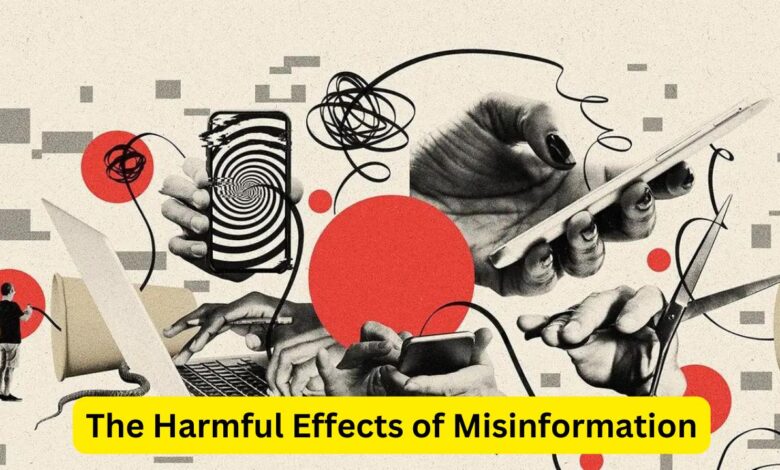The Harmful Effects of Misinformation

The Harmful Effects of Misinformation, In the age of information, the proliferation of misinformation has become a significant concern. Misinformation, which refers to false or misleading information shared without malicious intent, has a profound impact on society, influencing everything from individual decisions to public health outcomes. In this comprehensive article, we will explore the detrimental effects of misinformation, its implications for society, and strategies to combat it.
Understanding Misinformation
Misinformation is a pervasive issue in the digital age. It encompasses a range of false or misleading information that can be spread through various channels, including social media, news outlets, and even personal communication. Unlike disinformation, which is intentionally misleading, misinformation can be shared by individuals who believe it to be true.
The Spread of Misinformation
The rapid dissemination of misinformation is facilitated by the internet and social media platforms. These platforms enable information to be shared instantly across vast networks, often without adequate verification. Algorithms designed to boost engagement can inadvertently promote sensational or misleading content, amplifying its reach.
Impact on Public Health
One of the most concerning effects of misinformation is its impact on public health. Misinformation about medical treatments, vaccines, and health practices can lead to harmful consequences, including the spread of preventable diseases and ineffective treatments. For instance, misinformation regarding vaccines has contributed to declining vaccination rates and resurgence of diseases like measles.
Case Study: The Harmful Effects of Misinformation
The controversy surrounding vaccines exemplifies the dangerous impact of misinformation. False claims about vaccine safety have led to increased vaccine hesitancy and outbreaks of diseases that were previously under control. Public health experts emphasize the importance of relying on credible sources and evidence-based information to make informed health decisions.
Misinformation and Political Polarization
Misinformation also plays a significant role in political polarization. False or misleading information about political candidates, policies, and events can shape public opinion and influence electoral outcomes. This can undermine democratic processes and exacerbate divisions within society.
Example: Election Interference
There have been numerous instances where misinformation has been used to interfere in elections. False information about voting procedures, candidate qualifications, or election outcomes can erode trust in the electoral system and undermine the integrity of democratic institutions.
Economic Consequences of Misinformation
The economic impact of misinformation is another critical area of concern. Businesses can suffer from false claims or misleading reviews that affect their reputation and financial performance. For instance, misinformation about a company’s products or services can lead to decreased sales and damage to brand reputation.
Impact on Consumer Behavior
Misinformation can also affect consumer behavior. False claims about the safety or efficacy of products can lead to misguided purchasing decisions. Consumers who rely on inaccurate information may end up investing in products or services that do not meet their needs or expectations.
Combating Misinformation
Addressing the issue of misinformation requires a multifaceted approach. Here are several strategies to mitigate its impact:
Promoting Media Literacy
Educating individuals about media literacy is crucial in combating misinformation. This includes teaching people how to critically evaluate sources, fact-check information, and recognize common signs of misinformation. Media literacy programs can empower individuals to make informed decisions and reduce the spread of false information.
Enhancing Fact-Checking Mechanisms
Fact-checking organizations play a vital role in verifying information and providing accurate reporting. Strengthening fact-checking mechanisms and ensuring that credible sources are easily accessible can help counteract misinformation and provide the public with reliable information.
Implementing Platform Regulations
Social media platforms and news organizations have a responsibility to address misinformation on their platforms. Implementing regulations and algorithms that prioritize accurate information and reduce the spread of false claims can help mitigate the impact of misinformation. Collaboration between tech companies, policymakers, and fact-checkers is essential in developing effective solutions.
Encouraging Responsible Sharing
Individuals also have a role to play in combating misinformation. Encouraging responsible sharing practices, such as verifying information before sharing and reporting false claims, can help prevent the spread of misinformation. Social media users should be mindful of the content they share and consider its accuracy and source.
Misinformation in Crisis Situations
In times of crisis, misinformation can exacerbate the challenges faced by individuals and communities. Natural disasters, pandemics, and other emergencies are often accompanied by a surge in false information, which can hinder response efforts and endanger lives. Misinformation about the availability of resources, safety measures, or emergency protocols can lead to confusion and potentially dangerous behaviors. For example, during the COVID-19 pandemic, false claims about treatment methods and preventive measures created widespread confusion and undermined public health efforts. It is crucial to address misinformation swiftly and ensure that accurate, timely information is disseminated to support effective crisis management and protect public safety.
The Psychological Impact of Misinformation
The psychological effects of misinformation can be profound. Exposure to false information can lead to increased anxiety, stress, and confusion among individuals. This is particularly concerning when misinformation targets sensitive topics such as health or safety. The constant bombardment of misleading or false information can erode trust in legitimate sources and contribute to a sense of uncertainty and fear. Additionally, the emotional toll of discovering that one has been misled can lead to feelings of betrayal and frustration. Addressing these psychological impacts involves not only combating misinformation but also providing support and resources to help individuals process and cope with the effects.
Role of Education in Preventing Misinformation
Education plays a pivotal role in preventing the spread of misinformation. Integrating critical thinking and information literacy into educational curricula can equip students with the skills necessary to evaluate information critically and identify misleading content. By fostering a culture of skepticism and inquiry, educational institutions can help students develop the ability to discern credible sources from unreliable ones. Moreover, ongoing education for adults and professionals is essential in adapting to the evolving landscape of misinformation and ensuring that individuals remain informed and capable of navigating complex information environments.
The Future of Misinformation and Emerging Technologies
As technology continues to advance, new challenges in combating misinformation are likely to emerge. The rise of deepfakes, AI-generated content, and other advanced technologies presents both opportunities and risks in the fight against misinformation. While these technologies offer innovative ways to create and share information, they also make it more difficult to distinguish between genuine and false content. To address these challenges, ongoing research and development of new tools and techniques for detecting and mitigating misinformation will be essential. Collaboration between technologists, policymakers, and researchers will be crucial in developing effective strategies to navigate the evolving landscape of misinformation and safeguard the integrity of information.
Conclusion
Misinformation poses significant challenges to society, affecting public health, political stability, and economic performance. By understanding the harmful effects of misinformation and implementing strategies to combat it, we can work towards a more informed and responsible information environment. Promoting media literacy, enhancing fact-checking, and encouraging responsible sharing are crucial steps in addressing this issue.





2 Comments